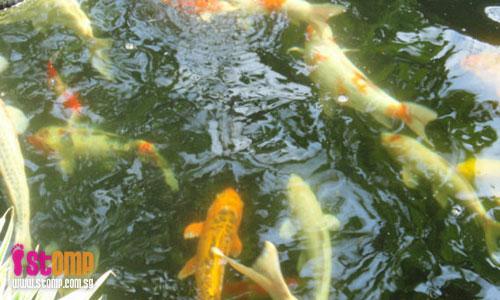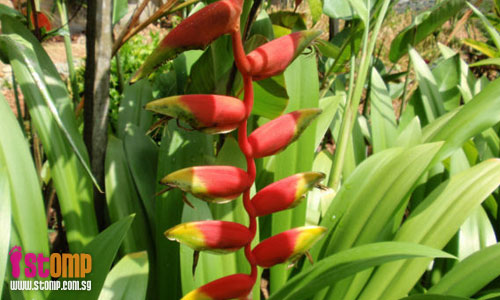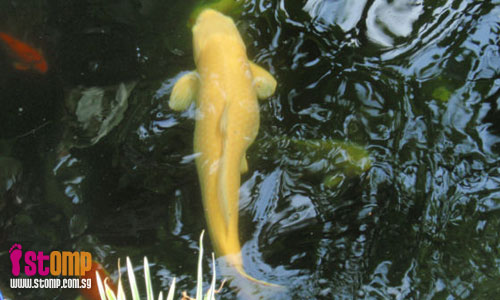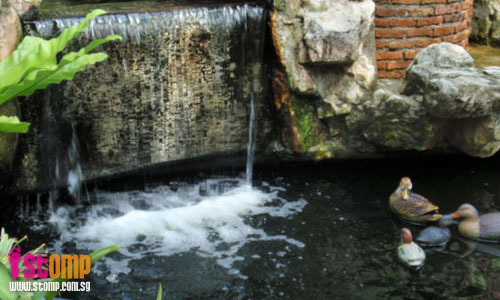
If you think life is all good living in a bungalow, read how some wildlife have turned a resident's life into a nightmare.
The STOMPer who sent in these photos said:
"During the Lunar New Year, I visited a friend who lives in a sprawling bungalow at Swiss Club Road and he was lamenting to me the woes of living in a bungalow which has a forest at the back of the house.
"Every week he had uninvited guests like squirrels and monkeys paying him visits at odd hours.
"The monkeys came to steal his bananas and also his wife's watch.
"The squirrels came to gnaw at the electric wires and one was even electrocuted on the first day of the Lunar New Year.
"The favourite food of the squirrels is the row of Heliconia rostrata which bears beautiful red flowers.
"These flowers were all destroyed except one of which I had snapped a picture.
"He had about 50 kois fish in his pond which is the size of a hall in a five-roomed HDB flat.
"Occasionally eagles came to devour the smaller kois and only the larger ones escaped unhurt.
"He said that although we have no natural disasters like tsunamis and hurricanes these creatures of the air and the forests had given him hours of headache and frustration.
"He is now contemplating moving to an area away from these uninvited marauders."



Singaporeans really have a penchant for hyperbole, if such wildlife intrusions can be compared to tsunamis and hurricanes. I'd like to hear this person complain about his problems to the villager in India who just had his crops and house flattened by a herd of elephants, or the herder in Kenya whose goats have been slaughtered by a leopard.
Swiss Club Road is situated very close to Bukit Timah Nature Reserve and the Central Catchment Area. Why am I not surprised that anyone living in the area would be subject to visitations by monkeys, squirrels, and birds of prey?
Many Singaporeans opt to live in these areas, and be "close to nature". Indeed, how many advertisements for condominium projects harp on the proximity to parks and nature reserves, or the presence of luxurious gardens? And yet, we often find people unable to accept that living close to nature doesn't just mean flowers and pretty birds and butterflies, it also means having to cope with other more undesirable aspects, from insects flying into your home, to marauding troops of monkeys, to venomous snakes in your garden.
Frankly, the problem here doesn't lie with the presence of wildlife, but rather, the inability of humans to adapt their behaviour so as to minimise the conflict. While the common (and deplorable) knee-jerk reaction would be to kill every insect, monkey, squirrel, bird and so on and so forth that even dares to come close to your home, that defeats the entire point of wanting to live close to Nature in the first place! There are countless non-lethal methods to prevent wildlife intrusions, that are not prohibitively expensive, and in fact, require just a bit of common sense.
If long-tailed macaques (Macaca fascicularis) are wandering into your house, then shut the windows! Or install window screens that will also prevent insects from flying into your home, especially when the lights go on at night. Don't leave small objects lying around where they can be easily snatched away by curious animals. Are these macaques visiting your neighbourhood because people are feeding them? Then get together with your neighbours and put a stop to such undesirable behaviour. Use squirts of water and noise to drive the monkeys away. After some time, they ought to get the hint. Monkey-proof all rubbish bins so that these primates won't associate your neighbourhood with food. Alternatively, a grove of fruit trees planted nearby might provide a diversion, so that the monkeys will choose to gather there instead of coming to your home.
As for squirrels gnawing on wires, I think the unfortunate squirrel that got electrocuted had more to lose than the inconvenienced people living in the house. The logical thing to do to prevent squirrels (as well as rats and mice) from gnawing on wires would be to trap and remove any squirrels that have taken up residence in your house, and seal up any gaps and holes in the exterior of the house, or at least prevent access with wire mesh. Such measures will also prevent snakes from entering your home, or birds and bats from using your house as a roosting and nesting site. As for the heliconia, there are safe and environmentally friendly repellents that will stop squirrels and other animals from munching on flowers.
Where it comes to the koi pond being decimated by birds, such a problem is only to be expected. Koi exist only because of a long history of artificial selection in captive settings; in comparison, the wild form of the common carp (Cyprinus carpio) is a drably coloured fish. Similarly, the wild form of the goldfish (Carassius auratus) is scarcely recognisable as the ancestor of all the fancy varieties of goldfish. In the wild, such colourful individuals are extremely obvious, and will be readily picked off by predators. What this person is witnessing is just natural selection in action. The predatory birds are merely capitalising on an easily spotted and readily accessible source of food. You might as well erect a sign that says "Birds: free food here!" above your pond.
Why doesn't the homeowner install some sort of netting above the pond? Or make the pond deeper so that even if a bird attacks, the fish can quickly swim for deeper water? Or grow floating aquatic vegetation like water hyacinth and water lilies, so that the fish can hide from predators? Even so, occasional losses will be inevitable, but that's the price of having an outdoor pond in the first place.
This person's complaints, while valid, are easily resolved. It just seems to me as if he wants to have his cake and eat it. He wants to have his nice little garden and koi pond, and live in this part of Singapore, without having to contend with the wildlife that also inhabit the area.
This is one of the biggest problems in terms of attitudes towards nature and wildlife in Singapore. For so many Singaporeans, being close to nature means strolling through your neighbourhood park, or having a picnic at the Singapore Botanic Gardens, or bringing the kids to the vegetable farms at Kranji. But these places are merely a hollow facsimile of what it means to be truly wild and untamed. The whole reason why gardens and parks exist is because we have poisoned and trapped and killed everything we have found unpleasant, and continue to trim, prune and rule over everything else with an iron fist. Nature is subjugated, browbeaten into submission, distorted and manicured to suit our trivial and arbitrary whims and fancies, to present a side that does not offend or frighten us. Compared to our nature areas, these town parks and gardens are practically sterile deserts, all but devoid of plant and animal diversity, except for those that we tolerate, or those that manage to survive despite our best efforts at eradication. Can you seriously think of replicating such results in an area where the lines between wild and urban are blurred, and where the wild things are not so respectful of human dominion?
Many people remain unable to understand that when we choose to live "close to nature", it entails having to live with all its varied unpredictable, sometimes undesirable aspects, whether it means birds waking you up before sunrise, bats roosting in your front porch, hornets nesting in your garden, or herons grabbing breakfast at your pond.
Personally, I think the person would have much fewer problems if he just took the necessary steps to prevent wildlife from entering his home. Maybe instead of fretting about animals eating his heliconia, he could just give up on them, let his garden get a little wild and overgrown, and plant some native shrubs and trees for the local wildlife to feed on. Instead of fancy koi, what about trying to replicate a forest stream with native fish, which I think are far more aesthetically pleasing than koi ponds anyway.
The BBC has a neat little campaign called Breathing Places, encouraging people to make their gardens and neighbourhoods more wildlife-friendly. A lot of them are applicable to the Singaporean context, such as say, creating a pond for aquatic creatures, or planting trees, shrubs and flowers that will feed native wildlife. It would be wonderful if we could have more Singaporeans making their gardens, parks and neighbourhoods more wildlife-friendly; Singapore, with its amazing biodiversity, deserves to be so much more than just a so-called Garden City.
Seriously, unlike many other cities that have to contend with megafauna like deer, big cats, and bears, our problems with wildlife (and even stray cats and dogs) seem pathetic in comparison.